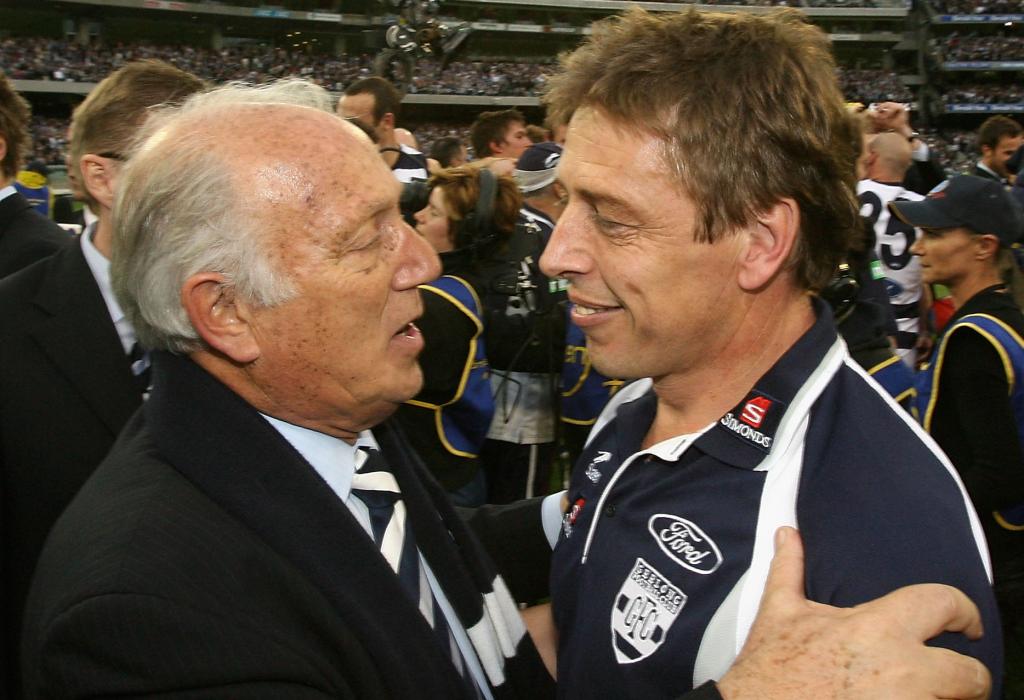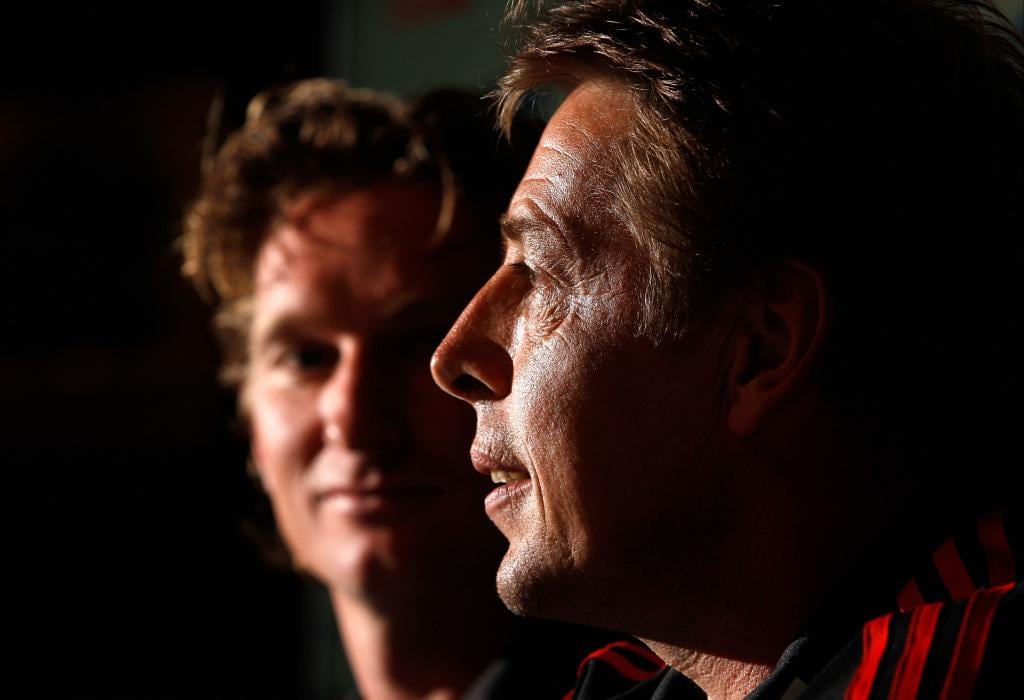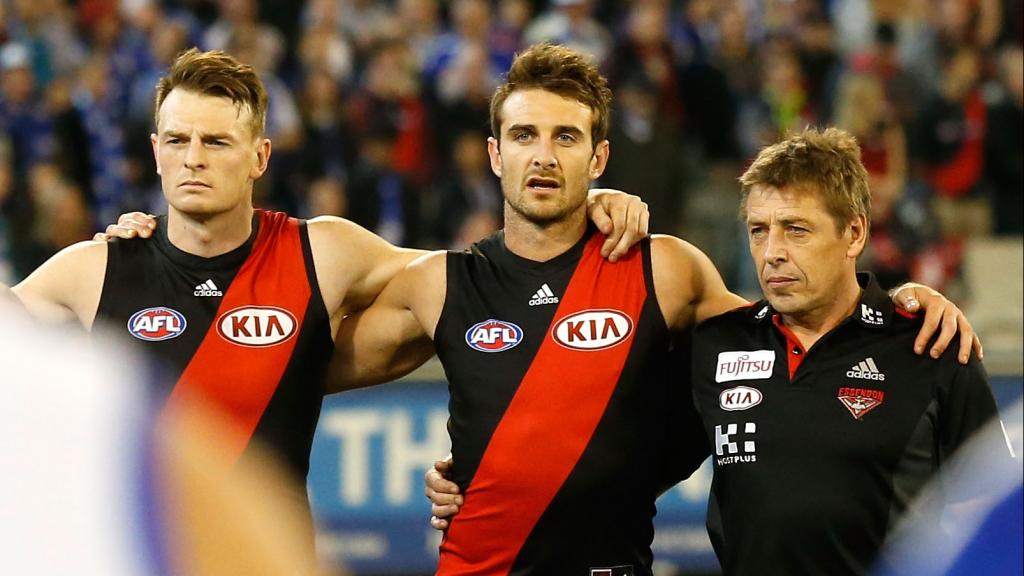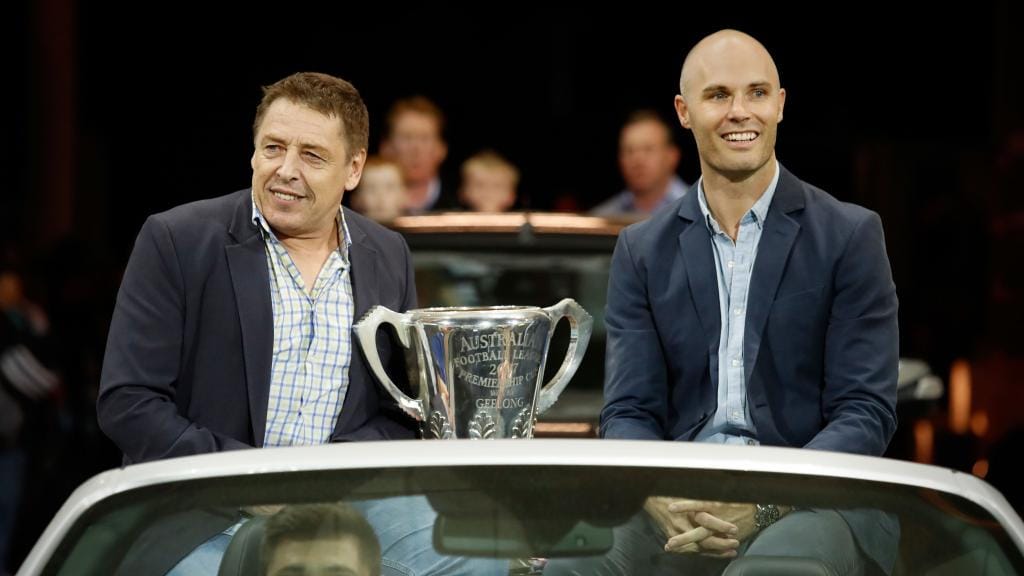IT'S BEEN two months since Mark Thompson's Port Melbourne house was raided by police as part of a long-running investigation into a drug trafficking syndicate.
Two men living in Thompson's house will appear in court next month to answer charges emanating from that raid. Victoria Police on Thursday said there was "no further update on the investigation of a 54-year-old Port Melbourne male". It added: "The investigation is still ongoing."
The life of Thompson, premiership captain at Essendon, two-time premiership coach at Geelong, has taken a wayward path in recent years.
Damian Barrett looks at those recent years of Bomber's life.
FRANK Costa refers to it as the "miserable trifecta", three events late into the first decade of the 2000s, which changed Mark Thompson.
According to Costa, a combination of private, financial and professional upheavals crashed down in the latter stages of an 11-year stint as Geelong coach, forever altering his life and football path.
Thompson's erratic behaviour of recent years has greatly concerned friends and colleagues.
People close to him worried long before the events of January, when vision and news of a police raid of his house dominated the news cycle for 72 hours, and many have reached out in recent times.
Only some have received a response.
Costa is not alone in identifying the 2009-10 period as messily defining for the now 54-year-old.
Initially, it was the little things which alerted people to the change. Thompson began missing meetings, falling asleep in others. He'd drift out of conversations.
But everything was OK, everything was normal, on game day.
The two hours before a game and the two-and-a-half hours of battle always remained Thompson's domain, even in the 2014 season at Essendon when the erratic nature of his behaviour was becoming extreme.
The players he has coached at two clubs loved him, knowing he always had their backs. They still do. He still does.
Though Thompson walked out on Costa and the Cats, Costa, like seemingly every former colleague, wants nothing but for Thompson's life to be a very good one.
"I feel for Mark at the moment, he's been through a terrible time over the last few years," Costa said.
"You have to go back to 2010, he's had eight years of tough times."
Frank Costa and Mark Thompson after the 2007 Grand Final win. Picture: AFL Photos
Thompson's troubles became public as much as private in January this year when police raided his Port Melbourne house. Drugs were found inside. Two men living in the house were arrested and will face charges in court next month.
Bomber's bizarre week: 'I'm not in the gang'
The late December, early January period was tumultuous for Thompson.
On Boxing Day 2017, 10 days before the police raid, Thompson attempted to visit a detainee - a Thai national with a history of drug-related charges - in the Maribyrnong Immigration Detention Centre.
Thompson was stopped by detention centre staff and was refused entry because of his condition.
A week later, Thompson visited again, on consecutive early January days, and was allowed in. He left with the detainee a suitcase, more than $5000 in US and Australian currency and a mobile phone.
The detainee was deported to Thailand the same day as Thompson's third visit to the Maribyrnong centre.
She has since published several photos of herself with Thompson on a publicly accessible social media platform.
Two days after she was deported, Thompson's house was raided. This information is not to suggest a link between the visits and the raid, merely to show a timeline of events that led to the much-publicised police involvement in Thompson's life.
Without the structure and requirements of an elite football club in his life, Thompson – star AFL player, genius AFL coach – has struggled.
Post Essendon, Thompson filled media roles, including special comments positions with Fox Footy and 3AW. His work in this space was often outstanding, as his unique openness, quirkiness, honesty and rawness made for great viewing and listening.
But there were days which just weren't right. Multiple colleagues at both organisations tell stories of times that, upon reflection, leaves them wondering if Thompson should have been given access to a live microphone.
Thompson removed the need for a decision to be made on more than one occasion when he just didn't turn up, as well as another time when he rang his media outlet of that day midway through the second quarter of a game he was meant to be covering from the first bounce to say, "I'm on my way".
In an interview with Costa this week, we asked: "Frank, people have been saying for some time, and sometimes with reference to hindsight, that his behaviour has been erratic at times. When you reflect upon his time at Geelong - did you see that at Geelong, or more since Geelong?"
Costa: "I saw it towards the finish at Geelong, in 2010, and more since.
"I think that's happened because his mind has been badly scrambled. I think those three things that I mentioned that happened to him in 2010 were too much for him, and I think the disappointment of the Essendon saga on top of that, hasn't helped him.
"And then this drug innuendo, whichever way that is going to go, goodness knows, but put all that on top of his mind … put all of that together and it is negative."
The secrecy requirements that Essendon officials placed on Thompson in 2010 as they began their audacious project to wrench him away from the Cats and across to the Bombers as James Hird's assistant weighed heavily, according to Costa.
That approach from the Bombers was one of the legs of the "miserable trifecta".
Costa said the break-up of Thompson's marriage and subsequent family upheaval as well as a significant land investment and attached interest repayment requirements were the two other parts of the trifecta.
Thompson's four seasons at Essendon were also years where he displayed erratic behaviour.
Thompson and James Hird at the announcement of their appointment. Picture: AFL Photos
The supplements saga of 2012, which played out publicly in 2013 and saw him personally fined $30,000 by the AFL, greatly disturbed him and saw him clash heatedly with then-chairman David Evans in front of the players at meetings.
As was the case at Geelong, Essendon players loved him through to his final match, which was as head coach in the 2014 elimination final, an extraordinary football achievement given the stressful and emotional backdrop attached to Thompson and the Bombers at that time.
At the end of 2013, when James Hird had been suspended by the AFL, Essendon sought a new coach.
Then-CEO Ray Gunston told people in September and October of that year that Thompson would not be considered for the main job. Seemingly, he had seen enough in the second half of 2013 to be sure that Thompson was no longer a good fit for the Bombers.
Gunston oversaw the implementation of a sub-committee, which put several candidates through a rigorous process, only to have its recommendations snubbed when Thompson was appointed.
At least one of the highly fancied candidates became aware in advance of the decision to go with Thompson, and let it be known to people connected with the club of his extreme displeasure at being "totally led down the garden path".
Gunston announced his resignation as Bombers chief executive just days after Thompson was appointed as coach. It was a key reason for his departure.
Gunston, and others at Essendon, clearly had major reservations about placing Thompson in charge of the playing group. To them, leadership and behaviour would always trump technical nous when analysing the qualities of a coach.
Others at the club at the time had a different view of the required skill set.
Even in that emotion-filled 2014 season, Thompson's genius as coach took the Bombers to the finals. They qualified for an elimination final, and probably should have beaten North Melbourne in that game. Thompson may have coached as well as at any stage of his two premiership years.
Thompson with his Essendon players ahead of his final match in charge. Picture: AFL Photos
But during that 2014 season, it became even more obvious to some people than it was in 2013, that the days in between the matches would occasionally pose as difficult ones for Thompson.
He missed several meetings, was late to other meetings, became flippant and distant in conversations. On one day after a game, he was seen by players asleep in his car, before the club arranged for him to be driven home.
Players have always loved Thompson, and he has made some appearances, sometimes very brief ones, at the regular gatherings of Geelong premiership players.
Last year at one such event, he appeared to be in great spirits, telling stories of making a financial killing in crypto-currency, before riding off into the night on his pushbike.
Mark Thompson and Tom Harley last year at the 10-year celebration of the 2007 flag. Picture: AFL Photos
Costa, president of Geelong for the entirety of Thompson's two-premiership stint as coach, cares deeply for Thompson.
"He finished 2010, in my opinion, in a very negative frame of mind," Costa said. "He joined Essendon, and of course we all know what went wrong there. It fell apart, he felt he was very unfairly treated. The AFL fined him $30,000, which he thought wasn't right.
"He couldn't get answers from the hierarchy at Essendon (about the drugs program), so he left football behind in a dour frame of mind. He hasn't been happy since, and of course the last thing that has cropped up, and has caused him to go away from Australia for a while to clear his mind, hasn't helped him at all, either. So I feel for him. In my opinion, he's a good guy, and an excellent coach of Geelong."
Costa speaks the words of a lot of Thompson's friends and colleagues in offering unconditional support.
"Sorry for what's happened to him, he's hurt himself as much as he's hurting others, so I feel for him there too, so hopefully he can get it all back together again … and I offer the hand of friendship to Mark forever," Costa said.
"He was very good to us, and straight with me. He never told me any fibs, what he didn't do was tell me the approach from Essendon. He should have gone to me or Cooky (chief executive Brian Cook), definitely gone to Cooky. He didn't. But if he wants that chat now, anything I can do to help him, I certainly would."


